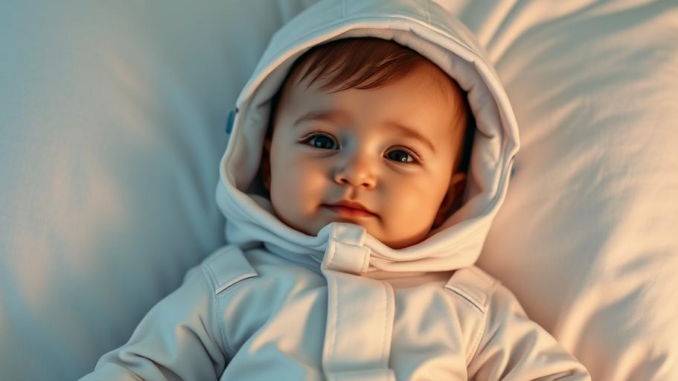
Summary
This groundbreaking technology utilizes AI to monitor babies’ motor skills in the comfort of their homes. The MAIJU smart jumpsuit offers a precise, objective assessment of infant motor development, potentially revolutionizing early pediatric care and offering a new standard for monitoring. This innovative approach promises to improve early detection of developmental delays and enhance personalized interventions.
See how TrueNAS offers real-time support for healthcare data managers.
** Main Story**
Okay, so, have you heard about this new smart jumpsuit for babies? It’s pretty wild, and it could seriously change how we track infant motor skills. It’s called MAIJU – which, admittedly, sounds like a character from a sci-fi movie – and it’s basically a wearable tech dream come true for pediatric care. Forget those clunky, subjective assessments of the past; this thing uses AI to give you super precise, objective data. It is pretty amazing, I have to say.
How the MAIJU Jumpsuit Actually Works
So, picture this: a baby wearing a regular-looking jumpsuit, but it’s packed with sensors. These sensors are constantly picking up on every little wiggle and movement during playtime, you know, just normal baby stuff at home. All that data gets fed into some pretty clever AI algorithms. Then, the AI compares the baby’s movements against established motor milestones – stuff like rolling over, sitting up, crawling. It even tracks how much time they spend in different positions. The idea being it gives you a really clear picture of their motor development trajectory.
And get this: a recent study showed that the MAIJU’s AI is just as accurate as trained specialists when it comes to spotting those milestones. That’s huge! Think about it, consistent, objective assessments, no matter where you are or how much access you have to specialized healthcare. It’s like having a pediatric motor development expert on call, 24/7.
Why This Matters: Benefits for Pediatric Care
Honestly, the implications are pretty significant. Here’s the breakdown:
- Early Warning System: Spotting potential developmental delays super early, which means interventions can start sooner, and, hopefully, have a bigger impact.
- Objective Data: No more relying solely on parents’ observations or infrequent check-ups. The AI takes out the guesswork.
- Parent Power: Parents get to see their child’s progress in real-time, and understand what’s happening with their development, that is really cool. It strengthens that bond and turns them into active participants.
- Custom-Fit Care: The detailed data collected can help tailor therapies to each baby’s specific needs. No more one-size-fits-all approaches.
- Easier Access: It cuts down on those trips to the clinic, making assessments way more accessible, especially for families in remote areas or who struggle with transportation.
Looking Ahead: The Future of Pediatric Monitoring
MAIJU is just one example, but it showcases the amazing potential of AI in healthcare. As the tech gets even better, imagine even more sophisticated tools for tracking and supporting children’s development. It will improve outcomes, personalize care, and put parents in the driver’s seat. And, I think, MAIJU could level the playing field. Imagine, every child gets the same level of assessment, regardless of where they live or what their background is.
However, it’s not just about motor skills. Future versions of this technology could expand to cover other developmental areas, giving us a holistic view of the child’s progress.
The Power Couple: AI and Wearable Tech
I believe this is just the beginning. The combination of AI and wearable tech is opening up a whole new world of possibilities in pediatric care. We are talking personalized, data-driven care that empowers both parents and healthcare providers. In the future, we might see this tech integrated with telehealth platforms, so doctors can monitor babies remotely and give real-time guidance. Think about it, regular progress updates from your doctor all from the comfort of your own home.
Also, this isn’t just limited to babies. Researchers are exploring similar sensor tech for older kids, too. Monitoring physical activity, sleep patterns, even detecting early signs of neurological or developmental problems. It’s all pretty exciting, if you ask me.


The MAIJU jumpsuit’s AI accuracy matching trained specialists is remarkable. Expanding this technology to integrate with telehealth platforms could provide remote monitoring and real-time guidance from doctors, increasing accessibility and convenience for families.